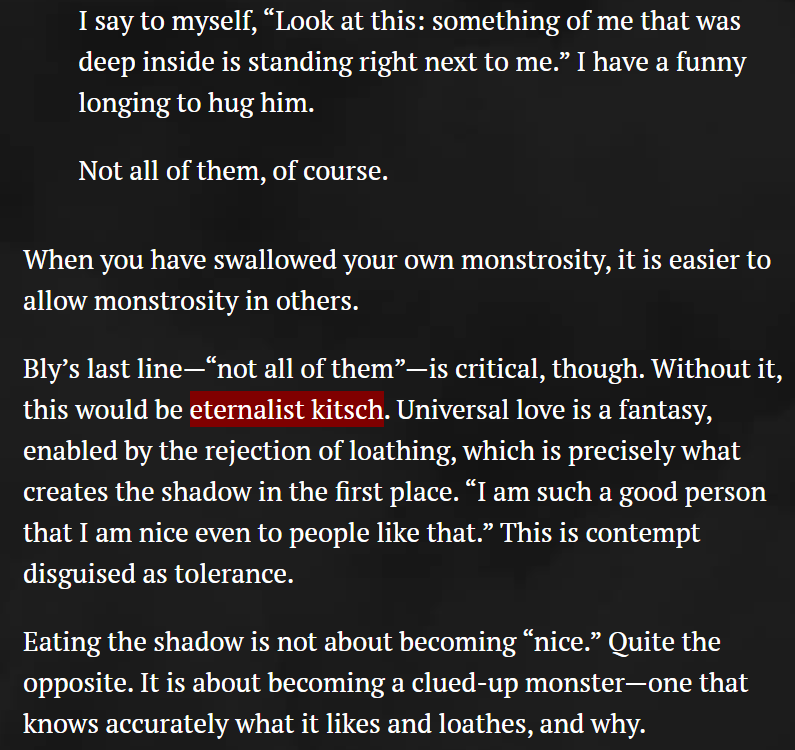I made this distinction a while ago and I think it's important.
Recently came across another interestingly similar distinction. https://twitter.com/GeniesLoki/status/1309243425376669707
Recently came across another interestingly similar distinction. https://twitter.com/GeniesLoki/status/1309243425376669707
First off though, there's a single line from an otherwise *deeply* forgettable film that has stuck with me for years. The film is the live action version of 101 Dalmatians (yes, really).
"It's not hatred that's important, it's the desire to annihilate."
This is a surprisingly good distinction.
This is a surprisingly good distinction.
In the same way that there is an anger -> rage transition from "I will fight you" to "I will fight you and I want it to hurt you" there is a hatred -> loathing transition from "I do not want this in my presence" to "This should not exist".
There is a very strong visceral felt sense of "AAAH KILL IT WITH FIRE" you get when you encounter a target of loathing. The desire to annihilate.
What's interesting with both of these transitions is that in some sense the stronger emotion is just the weaker emotion but more so. Rage is just more anger, loathing is just more hatred. But it crosses a threshold where the response changes and this in turn changes the feeling.
You get this with positive emotions too I think. Love is "just" liking but you do it lots, but at some point the quality of the emotion changes in a way that saying "I love you" is more than "I like you a lot" because you've crossed that threshold.
I often think of emotions as dispositional: They are (or include) a felt sense that you are predisposed towards a particular class of actions or attitude towards the world. e.g. liking something means you are inclined towards more of it in your life.
(That's not literally true, it's possible to like something and not want to do it again, but it gestures vaguely in the direction of truth)
I think often this kind of threshold arises as a kind of felt sense of inevitability to that disposition. At normal levels you feel like "I would prefer something to be done" but at some point you cross over to "the natural order demands that something be done".
Josef Pieper defines love as a felt sense that it is wonderful that something or someone exists.
To me this feels like the universe is made better for the object of love, in a way that feels like it extends beyond my mere personal preferences.
To me this feels like the universe is made better for the object of love, in a way that feels like it extends beyond my mere personal preferences.
Liking feels like "It is good that this is in my presence". It's not that love *isn't* relational, but it feels like it has transcended that someone. Liking is more about me, and my relation to that which I like, while love is more about that which is loved.
The hatred/loathing line is similar. "It is bad that this is in my presence" vs "It is bad that this exists".
I was reading @Meaningness's work on hunting the shadow earlier and this bit struck me.
One of the interesting things about experiencing loathing towards someone like this is that there's no feeling that there's a shadow there. There are people that rub you wrong, these are people who you will probably learn something about yourself by understanding that reaction.
And then there are people who your reaction is just a profound sense of "It is bad that this world has you in it" and... it's not that they definitely don't contain any elements of your shadow, but that feeling is probably not pointing towards it.
I think this distinction is quite tricky to navigate. It's tempting and easy to fan the flames of hatred and allow yourself to loathe people who are probably basically fine by focusing on their worst traits.
But as with all emotions, repudiating the emotion in its entirety cuts you off from important and useful ways of being, and sometimes when you encounter someone or something truly loathsome, it's worth acknowledging to yourself that it is genuinely bad that they exist.
(You probably shouldn't act on that feeling too thoroughly though. The police frown on that)

 Read on Twitter
Read on Twitter


